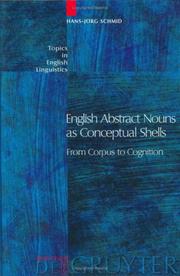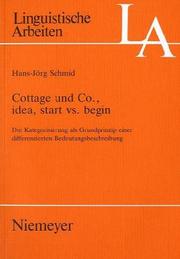| Listing 1 - 10 of 35 | << page >> |
Sort by
|
Book
ISBN: 9783110214208 9783110214215 3110214210 1283627515 9781283627511 3110214202 9786613939968 661393996X 311173854X Year: 2012 Volume: v. 4 Publisher: Berlin de Gruyter
Abstract | Keywords | Export | Availability | Bookmark
 Loading...
Loading...Choose an application
- Reference Manager
- EndNote
- RefWorks (Direct export to RefWorks)
Speakers tend to compose their utterances in such a way that the message they want to get across is hardly ever fully encoded by the meanings of the words and the grammar they use. Instead speakers rely on hearers adding conceptual and emotive content while interpreting the contextually appropriate meanings and intentions behind utterances. This insight, which is of course particularly relevant in all kinds of indirect, figurative or humorous talk, lies at the heart of the linguistic discipline of pragmatics. If pragmatics is the study of meaning-in-context, then cognitive pragmatics can be broadly defined as encompassing the study of the cognitive principles and processes involved in the construal of meaning-in-context. While it would seem only natural that pragmatics as such should have addressed such cognitive issues anyway, it has mainly been due to the historical rooting of this discipline in the philosophy of language that psychological aspects have not been in the pragmatic limelight to date. Being part of the 9-volume-series Handbooks of Pragmatics, this volume is the first to systematically survey this terrain from a wide range of perspectives. It collects state-of-the-art contributions by leading experts from the fields of pragmatics, psycholinguistics, cognitive linguistics, clinical linguistics and historical linguistics. The volume is divided into four parts which tackle the following questions: Part I: The cognitive principles of pragmatic competence What are the general cognitive principles underlying pragmatic competence, i.e. the skill to arrive at context-dependent meanings of utterances? What are the cognitive underpinnings of language users' ability to compute or infer intended meanings in the role of hearers and to give hints as to how to decode intended meanings in the role of speakers? Part II: The psychology of pragmatics What are the actual cognitive processes taking place during online construal of meaning-in-context on the basis of encoded messages? How is pragmatic competence acquired in childhood? What are the types, sources and effects of pragmatic disorders, i.e. impairments of pragmatic competence? Part III: The construal of non-explicit and non-literal meaning-in-context What are the cognitive principles and processes involved in the construal of meanings of non-explicit and indirect utterances? How do we process figurative meanings, humour and gestures? Part IV: The emergence of linguistic structures from meaning-in-context What are the repercussions of the (repeated) construal of context-dependent meanings on linguistic structures and the linguistic system? How does the system change under the influence of the construal of meanings in social situations? Reduced series price (print) available! › For orders, please contact degruyter@de.rhenus.com.
Psycholinguistics --- Pragmatics --- Semantics --- Context (Linguistics) --- Cognitive grammar --- 801.56 --- Syntaxis. Semantiek --- 801.56 Syntaxis. Semantiek --- Pragmatics. --- Semantics. --- Cognitive grammar. --- Psycholinguistics. --- Language, Psychology of --- Language and languages --- Psychology of language --- Speech --- Linguistics --- Psychology --- Thought and thinking --- Cognitive linguistics --- Grammar, Comparative and general --- Situation (Linguistics) --- Formal semantics --- Semasiology --- Semiology (Semantics) --- Comparative linguistics --- Information theory --- Lexicology --- Meaning (Psychology) --- Pragmalinguistics --- General semantics --- Logic, Symbolic and mathematical --- Semantics (Philosophy) --- Psychological aspects --- Context --- Philosophy --- Applied Linguistics, Pragmatics, Cognitive Linguistics.
Book
ISBN: 9783503122486 3503122486 Year: 2011 Volume: 25 Publisher: Berlin Schmidt
Abstract | Keywords | Export | Availability | Bookmark
 Loading...
Loading...Choose an application
- Reference Manager
- EndNote
- RefWorks (Direct export to RefWorks)
English language --- Grammar --- Morphology --- Word formation --- English language - Morphology --- English language - Word formation

ISBN: 3110167670 1306274796 3110808706 3111749436 9783110808704 9783110167672 9783111749433 Year: 2000 Volume: 34 Publisher: Berlin De Gruyter
Abstract | Keywords | Export | Availability | Bookmark
 Loading...
Loading...Choose an application
- Reference Manager
- EndNote
- RefWorks (Direct export to RefWorks)
Lexicology. Semantics --- English language --- Grammar --- 802.0-56 --- -Germanic languages --- Engels: syntaxis; semantiek --- Noun --- Noun. --- 802.0-56 Engels: syntaxis; semantiek --- -Engels: syntaxis; semantiek --- -802.0-56 Engels: syntaxis; semantiek --- Germanic languages --- Noun phrase. --- Complex nominals --- Phrasal noun --- Subject --- Nominals

ISBN: 3484302909 3111355772 Year: 1993 Publisher: Tübingen Niemeyer
Abstract | Keywords | Export | Availability | Bookmark
 Loading...
Loading...Choose an application
- Reference Manager
- EndNote
- RefWorks (Direct export to RefWorks)
Cottage und Co., idea, start vs. begin: Die Kategorisierung als Grundprinzip einer differenzierten Bedeutungsbeschreibung (Linguistische Arbeiten)
Categorisatie (Taalwetenschap) --- Catégorisation (Linguistique) --- Engels: syntaxis; semantiek --- -Engels: syntaxis; semantiek --- 802.0-56 Engels: syntaxis; semantiek --- -Cognitive linguistics --- 802.0-56 --- Categorization (Linguistics) --- Cognitive grammar --- Semantics --- Classification (Linguistics) --- Formal semantics --- Semasiology --- Semiology (Semantics) --- Psychological aspects --- Cognitive linguistics --- Grammar, Comparative and general --- Psycholinguistics --- Linguistic analysis (Linguistics) --- Lexicology. Semantics --- German language --- Cognitive grammar. --- Psychological aspects.
Book
ISBN: 9780198814771 0198814771 0191852465 0192546376 Year: 2020 Publisher: Oxford : Oxford University Press,
Abstract | Keywords | Export | Availability | Bookmark
 Loading...
Loading...Choose an application
- Reference Manager
- EndNote
- RefWorks (Direct export to RefWorks)
This volume outlines a model of language that can be characterized as functionalist, usage-based, dynamic, and complex-adaptive. The core idea is that linguistic structure is not stable and uniform, but continually refreshed by the interaction between three components: usage, the communicative activities of speakers; conventionalization, the social processes triggered by these activities and feeding back into them; and entrenchment, the individual cognitive processes that are also linked to these activities in a feedback loop. Hans-Joerg Schmid explains how this multiple feedback system works by extending his Entrenchment-and-Conventionalization Model, showing how the linguistic system is created, sustained, and continually adapted by the ongoing interaction between usage, conventionalization, and entrenchment. Fulfilling the promise of usage-based accounts, the model explains how exactly usage is transformed into collective and individual grammar and how these two grammars in turn feed back into usage.0The book is exceptionally broad in scope, with insights from a wide range of linguistic subdisciplines. It provides a coherent account of the role of multiple factors that influence language structure, variation, and change, including frequency, economy, identity, multilingualism, and language contact.
Grammar --- Pragmatics --- Sociolinguistics --- Konvention. --- Language and languages --- Sprachgebrauch. --- Sprachnorm. --- Sprachsystem. --- Philosophy. --- Philosophy
Book
ISBN: 9783110341423 3110341425 9783110341430 3110341433 9783110341300 3110341301 3110394529 9783110394528 9783110634891 3110634899 Year: 2017 Publisher: Berlin De Gruyter Mouton
Abstract | Keywords | Export | Availability | Bookmark
 Loading...
Loading...Choose an application
- Reference Manager
- EndNote
- RefWorks (Direct export to RefWorks)
In recent years, linguists have increasingly turned to the cognitive sciences to broaden their investigation into the roots and development of language. With the advent of cognitive-linguistic, usage-based and complex-adaptive models of language, linguists today are utilizing approaches and insights from cognitive psychology, neuropsychology, social psychology and other related fields. A key result of this interdisciplinary approach is the concept of entrenchment-the ongoing reorganization and adaptation of communicative knowledge. Entrenchment posits that our linguistic knowledge is continuously refreshed and reorganized under the influence of social interactions. It is part of a larger, ongoing process of lifelong cognitive reorganization whose course and quality is conditioned by exposure to and use of language, and by the application of cognitive abilities and processes to language. This volume enlists more than two dozen experts in the fields of linguistics, psycholinguistics, neurology, and cognitive psychology in providing a realistic picture of the psychological and linguistic foundations of language. Contributors examine the psychological foundations of linguistic entrenchment processes, and the role of entrenchment in first-language acquisition, second language learning, and language attrition. Critical views of entrenchment and some of its premises and implications are discussed from the perspective of dynamic complexity theory and radical embodied cognitive science.
Language and languages --- Cognitive learning. --- Cognitive grammar. --- Psycholinguistics. --- Language, Psychology of --- Psychology of language --- Speech --- Linguistics --- Psychology --- Thought and thinking --- Cognitive linguistics --- Grammar, Comparative and general --- Psycholinguistics --- Learning --- Study and teaching --- Psychological aspects. --- Psychological aspects --- Didactics of languages --- Cognitive Linguistics. --- Entrenchment.
Book
ISBN: 350317012X 9783503170128 Year: 2016 Publisher: Berlin: Schmidt,
Abstract | Keywords | Export | Availability | Bookmark
 Loading...
Loading...Choose an application
- Reference Manager
- EndNote
- RefWorks (Direct export to RefWorks)
Digital
ISBN: 9783110808704 9783110167672 Year: 2012 Publisher: Berlin ;; Boston De Gruyter Mouton
Abstract | Keywords | Export | Availability | Bookmark
 Loading...
Loading...Choose an application
- Reference Manager
- EndNote
- RefWorks (Direct export to RefWorks)
Digital
ISBN: 9783111355771 9783484302907 Year: 2010 Publisher: Tübingen Max Niemeyer Verlag
Abstract | Keywords | Export | Availability | Bookmark
 Loading...
Loading...Choose an application
- Reference Manager
- EndNote
- RefWorks (Direct export to RefWorks)
Book
ISBN: 9783110205176 3110205173 9786612716256 3110216035 1282716255 9783110216035 Year: 2010 Volume: 13 Publisher: New York, N.Y. De Gruyter Mouton
Abstract | Keywords | Export | Availability | Bookmark
 Loading...
Loading...Choose an application
- Reference Manager
- EndNote
- RefWorks (Direct export to RefWorks)
The volume presents an up-to-date collection of methodologically sensitive contributions providing mainly enthusiastic, at times also critical support for the cognitive-linguistic enterprise. The book is important for the advancement of cognitive linguistics because the contributions demonstrate the seriousness of its ambitions to develop into a set of testable linguistic approaches. For the same reason, the volume is a contribution to our understanding of language in general, since it puts a promising modern approach on firmer ground. Assets of the book include the wide range of linguistic phenomena studied (individual concepts, fundamental semantic problems like vagueness and polysemy, grammatical issues incl. gender and tense, collocations, constructions and speech acts) and the scope of applied perspectives including lexicographical, computational, developmental and critical discourse ones. The languages investigated are English, German, Dutch, Polish and Italian. Common to the contributions is the desire to bring together observed patterns of linguistic usage with concepts and models established in cognitive linguistics. In addition, all contributions have an empirical basis and emphasize the need to rely on a sound methodology. The linguistic phenomena investigated span the range from the lexico-conceptual and collocational level to constructions, grammatical categories and functions. Two complementary perspectives of language and cognition are represented in the volume: In one group, the established methods of psycholinguistic experimentation, quantitative corpus analysis and computational simulation are exploited to demonstrate the viability and to increase the plausibility of cognitive-linguistic thinking. The second group tests well-known cognitive-linguistic approaches like Conceptual Metaphor Theory, the Theory of Idealized Cognitive Models and Construction Grammar against authentic data demonstrating their applicability and explanatory potential. Both groups include contributions reaching beyond the scope of traditional cognitive-linguistic topics, e.g. by taking a critical stance of reductionist cognitive thinking. The volume is of interest to cognitive linguists, psycholinguists, theoretical linguists, lexicologists, and lexicographers.
Psycholinguistics --- Language and languages --- Usage --- #KVHA:Taalkunde --- #KVHA:Cognitieve linguïstiek --- #KVHA:Corpuslinguïstiek --- #KVHA:Semantiek --- -Usage. --- Language and languages -- Grammars. --- Language and languages -- Usage. --- Language and languages. --- Languages & Literatures --- Philology & Linguistics --- Usage. --- Grammars. --- Linguistic usage --- Usage, Linguistic --- Grammar --- Grammar, Polyglot --- Polyglot grammar --- Grammars --- Language and languages - Usage --- Cognitive linguistics. --- language acquisition. --- lexicology. --- semantics.
| Listing 1 - 10 of 35 | << page >> |
Sort by
|

 Search
Search Feedback
Feedback About UniCat
About UniCat  Help
Help News
News